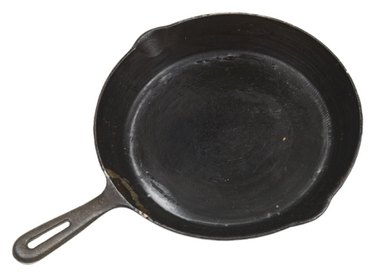
When it comes to frying, sauteing and searing foods, there are a variety of cookware options. At-home cooks are often drawn to cast-iron skillets because of their reputation as a favorite among professional chefs. However, while there are many benefits to using a cast-iron skillet in your kitchen, there are some drawbacks to this type of pan as well. Considering both the pros and cons can help you determine whether a cast-iron skillet is a good fit for your home so you do not waste your money.
Pro – Durable
Video of the Day
One of the most significant advantages to a cast iron skillet is its durability. If properly taken care of, it can last for years. A cast iron skillet is made by filling a sand mold with molten iron so when it solidifies, the finished product is extremely heavy and sturdy. It can withstand extremely high temperatures and resists wear and tear that might occur with other types of cookware. A cast iron skillet is also formed as a single piece so you do not have to worry about its handle coming loose over time.
Video of the Day
Pro – Even Heat Distribution
Many cooks prefer using a cast iron skillet over other options because of its superior performance on the stove. With a cast iron skillet, heat is distributed evenly across the bottom of the pan and maintained throughout the cooking process. You may find this particularly helpful if you regularly cook over an open fire, such as on camping trips. The even heat distribution also makes a cast iron skillet ideal for sauteing foods.
Pro - Versatile
Because the cookware is made entirely from molten iron, the entire cast iron skillet can withstand high temperatures. As a result, it can go from your cooktop to your oven when recipes call for baking a dish to finish it off. In fact, it is so versatile that it can also be used on a barbecue grill or campfire as well.
Con- Requires Seasoning
One of the main reasons that individuals shy away from a cast iron skillet is its need for seasoning. Seasoning refers to the process of smoothing a rough cast iron surface by filling its pores with some type of grease. By seasoning your skillet, you ensure that it has a non-stick surface. Without seasoning, food is likely to stick to the skillet and create a mess that is difficult to clean up. You must season your skillet before using it for the first time and it is typically recommended that you continue to season it occasionally to maintain its non-stick surface. Seasoning your skillet also prevents it from rusting. If you prefer cookware that requires no maintenance, a cast iron skillet is probably not a good fit for your kitchen.
Con – Heavy
A cast iron skill is extremely heavy. It is much heavier than other types of skillets and frying pans, including aluminum and stainless steel. While its weight is part of the reason that a cast iron skillet is so durable, it can be difficult to handle, particularly for elderly cooks, and its weight may present a problem when it comes to storage as well.